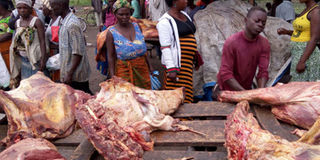Authorities must inspect meat sold on markets

Once again, attention has been drawn to high health risk that meat is bound to expose Ugandans to. The Uganda Veterinary Association (UVA), the umbrella body of veterinary doctors in Uganda, has raised alarm at the failing veterinary services in the country that has subjected Ugandans to consuming meat from poorly treated animals.
Not only are vet practitioners absconding from treating animals, but farmers are also assuming the role of vets and treating their animals themselves. This is no doubt a recipe for disaster, especially at a time when zoonotic diseases such as anthrax, Rift Valley fever, brucellosis and Crimean fever have broken out.
In the last six months, there have been reports of an outbreak of Anthrax in the districts of Arua, Moyo, Ajumani, Kapchorwa, Kween and Kiruhura and Crimean-Congo fever in Nakaseke and Mubende districts while Rift Valley Fever in Buikwe and Nakaseke districts.
That such a fraternity is raising this concern should not be ignored. While national per capita meat consumption in Uganda is estimated at 6kg, compared to between 50kg to 60kg per capita in developed countries, this is still a source of food for many Ugandans.
With 80 per cent of all towns in the cattle corridor relying on slaughter slabs for the supply of meat to town residents, it is critical that the meat is inspected and animals exposed to proper treatment.
The slackening of veterinary services is bound to not only have health, but also economic implications. At the merging of the ministries of Fisheries and Animal Husbandry with Agriculture, proper channels of service provision should have been outlined. An audit into the workings of the ministry will go a long way to sort out the mess in the veterinary.
Right now, veterinary doctors at sub-county levels lack the necessary facilitation such as motorcycles to carry out inspection and awareness.
A degree of order is needed right from the grass roots and some form of collaboration among stakeholders right from issues of understaffing, purchase of drugs for animal treatment, hygiene at slaughter house and butcheries to farmer senstisation is critical.
Previous memorandums of understanding between bodies such as Uganda National Bureau of Statistics and Kampala Butchers and Traders Association, Kampala Capital City Authority and understandings with local governments, must be revisited. It is high time the ministry enforced resolutions to uphold the standards of meat safety.
Ugandans in their individual capacities must also be vigilant by ensuring that the meat they consume is purchased from designated and other authorised places. Don’t lead yourself to the grave.




